The ACA Code of Ethics 2024 serves as a comprehensive guide for ethical counseling practice, outlining the principles and values that counselors must adhere to. This code provides essential guidance on various ethical considerations, ensuring the well-being of clients and the integrity of the counseling profession.
This article delves into the key elements of the ACA Code of Ethics 2024, exploring its ethical standards, responsibilities, and decision-making frameworks. It also addresses emerging ethical challenges and future directions in counseling practice.
Introduction: Aca Code Of Ethics 2024
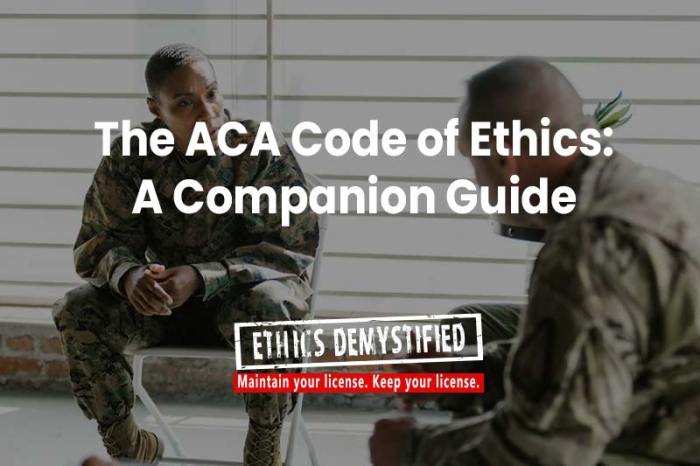
The ACA Code of Ethics 2024 is a comprehensive set of ethical guidelines that serves as a roadmap for ethical decision-making and professional conduct for counselors. It Artikels the fundamental principles and values that should guide counselors in their interactions with clients, colleagues, and the broader community.
The code emphasizes the importance of counselor competence, integrity, and respect for diversity. It also provides specific guidance on issues such as confidentiality, informed consent, and dual relationships. By adhering to the code, counselors can ensure that they are providing ethical and professional services to their clients.
Key Principles and Values
The ACA Code of Ethics 2024 is based on several key principles and values, including:
- Autonomy:Respecting the client’s right to make their own decisions.
- Beneficence:Acting in the best interests of the client.
- Nonmaleficence:Avoiding harm to the client.
- Justice:Treating all clients fairly and equitably.
- Fidelity:Keeping promises and commitments made to clients.
Ethical Standards for Counselors
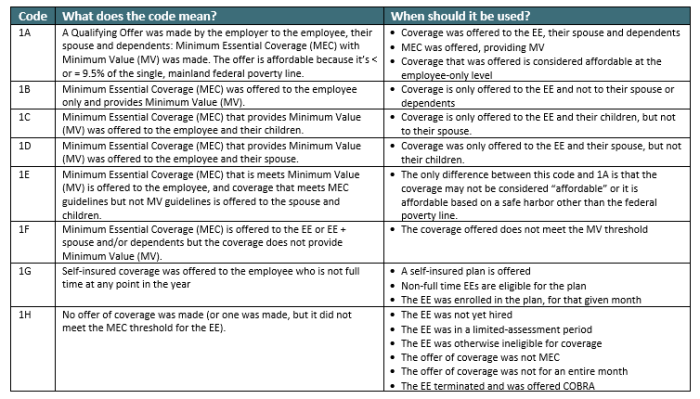
Counselors are bound by a strict code of ethics that guides their professional conduct. These standards are designed to protect clients and ensure the integrity of the counseling profession.
One of the most important ethical guidelines for counselors is the principle of confidentiality. Counselors must keep all information about their clients confidential, except in cases where there is a clear and imminent danger to the client or others.
Counselors must also obtain informed consent from clients before providing any services. This means that clients must be fully informed about the nature of the counseling process, the potential risks and benefits, and their rights as clients.
Counselors must avoid dual relationships with clients. This means that counselors cannot engage in any personal or business relationships with clients that could compromise their professional judgment or objectivity.
The ACA Code of Ethics 2024 is a valuable resource for healthcare professionals, including those working in the operating room. The code provides guidance on ethical issues that arise in the OR, such as patient confidentiality, informed consent, and end-of-life care.
For instance, the code states that nurses must respect patient autonomy and provide information about their care in a way that allows them to make informed decisions. Additionally, the code addresses ethical issues related to the use of technology in the OR, such as the use of robotic surgery and the handling of patient data.
Operating room RNs can use the code to guide their practice and ensure that they are providing ethical care to their patients. The ACA Code of Ethics 2024 is an essential tool for all healthcare professionals who work in the operating room.
Maintaining Professional Boundaries
Maintaining professional boundaries is essential for counselors. Counselors must avoid any physical contact with clients, and they must not engage in any sexual or romantic relationships with clients.
Counselors must also be aware of their own personal biases and limitations. They must refer clients to other professionals when necessary, and they must avoid making any judgments about clients based on their personal beliefs or values.
Avoiding Conflicts of Interest
Counselors must avoid any conflicts of interest that could compromise their professional judgment or objectivity. This means that counselors cannot provide services to clients who are also their friends, family members, or business associates.
Counselors must also be careful not to accept any gifts or favors from clients that could create a conflict of interest.
Ethical Responsibilities in Counseling Practice
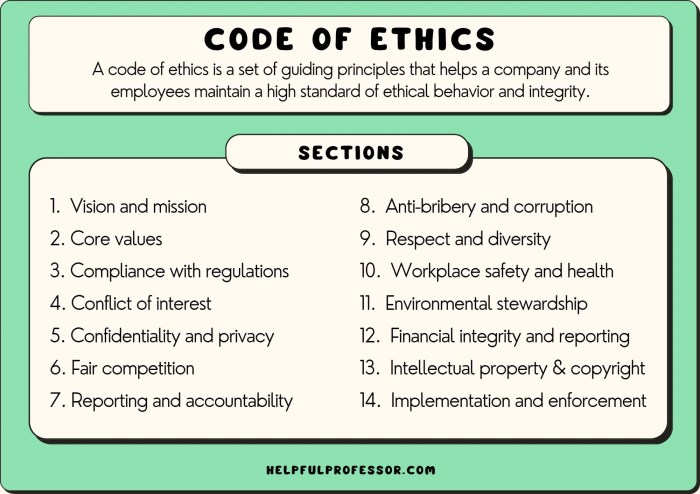
Counselors have a fundamental role in promoting client well-being and respecting diversity. This entails understanding and embracing the unique cultural, social, and personal characteristics of each client.
Cultural Competence
Cultural competence is essential for effective counseling. Counselors must be aware of their own cultural biases and limitations, and strive to develop a deep understanding of the cultures represented by their clients. This includes respecting different values, beliefs, and communication styles.
Social Justice and Advocacy
Counselors have an ethical obligation to advocate for social justice and equity. They should be aware of the systemic barriers that marginalized populations face and work to create a more inclusive and just society. This includes advocating for policies and programs that promote well-being and reduce disparities.
Ethical Decision-Making and Resolution
Ethical decision-making is a critical aspect of counseling practice, requiring counselors to navigate complex ethical dilemmas and make decisions that align with ethical principles. This section provides a framework for ethical decision-making and explores the role of ethical consultation, supervision, and peer support in resolving ethical dilemmas.
Counselors should engage in a systematic and thoughtful process when making ethical decisions. This process involves:
- Identifying the ethical issue and relevant ethical principles.
- Gathering relevant information and consulting with appropriate resources.
- Considering the potential consequences of different courses of action.
- Making a decision that is consistent with ethical principles and the client’s best interests.
- Documenting the decision-making process and rationale.
Ethical Consultation
Ethical consultation involves seeking guidance from colleagues, supervisors, or ethics committees when faced with complex ethical dilemmas. Consultation can provide valuable insights, perspectives, and support in navigating ethical challenges.
Supervision
Supervision provides a structured and supportive environment for counselors to discuss ethical dilemmas and receive guidance from experienced professionals. Supervisors can offer valuable insights, support, and accountability, helping counselors make ethical decisions that are in the best interests of their clients.
Peer Support
Peer support involves seeking guidance and support from colleagues who have faced similar ethical challenges. Peer support groups or networks can provide a safe and confidential space for counselors to discuss ethical dilemmas and share their experiences.
Ethical Challenges and Future Directions
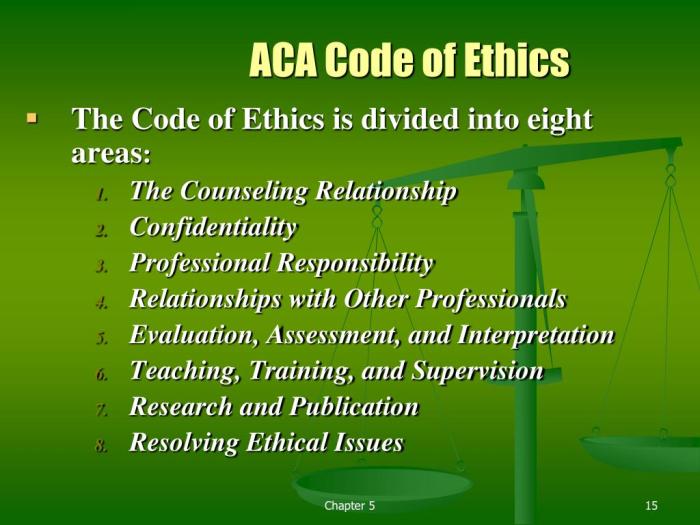
As the counseling profession continues to evolve, it faces new ethical challenges that require careful consideration. The rapid advancement of technology, the pervasive use of social media, and the changing societal norms all have a significant impact on ethical practice.
One of the most pressing ethical challenges is the increasing use of technology in counseling. While technology can provide new opportunities for reaching clients and delivering services, it also raises concerns about privacy, confidentiality, and informed consent. Counselors need to be aware of the ethical implications of using technology and take steps to protect client information and maintain professional boundaries.
Impact of Social Media
Social media has become an integral part of our lives, and it is increasingly being used for professional networking and communication. However, counselors need to be mindful of the ethical implications of using social media. For example, counselors should avoid posting personal information about clients or engaging in online discussions that could compromise client confidentiality.
Evolving Societal Norms
Societal norms are constantly evolving, and this can have a significant impact on ethical practice. For example, the increasing acceptance of LGBTQ+ relationships has led to new ethical considerations for counselors working with LGBTQ+ clients. Counselors need to be aware of the changing societal norms and be prepared to adapt their practice accordingly.
Case Studies and Ethical Dilemmas
Ethical dilemmas are inherent in the counseling profession, as counselors often encounter situations where multiple ethical principles conflict. Case studies and scenarios provide valuable opportunities to explore these dilemmas and develop ethical decision-making and resolution strategies.
When faced with an ethical dilemma, counselors should consider the following steps:
- Identify the ethical issues involved.
- Review the relevant ethical codes and guidelines.
- Consider the potential consequences of different courses of action.
- Consult with colleagues, supervisors, or ethics committees for guidance.
- Make a decision that is consistent with ethical principles and the best interests of the client.
Case Study 1: Confidentiality
A counselor is working with a client who discloses that they have been sexually abused by a family member. The client asks the counselor to keep this information confidential, as they are afraid of the consequences if the family member finds out.
The counselor is torn between respecting the client’s confidentiality and reporting the abuse to the authorities, as required by law.
Case Study 2: Dual Relationships
A counselor is providing therapy to a client who is also a close friend. The counselor has been struggling to maintain a professional boundary with the client, and they have begun to have romantic feelings for them. The counselor is unsure of how to proceed, as they do not want to harm the client or violate ethical principles.
Ethical Practice in Different Counseling Settings
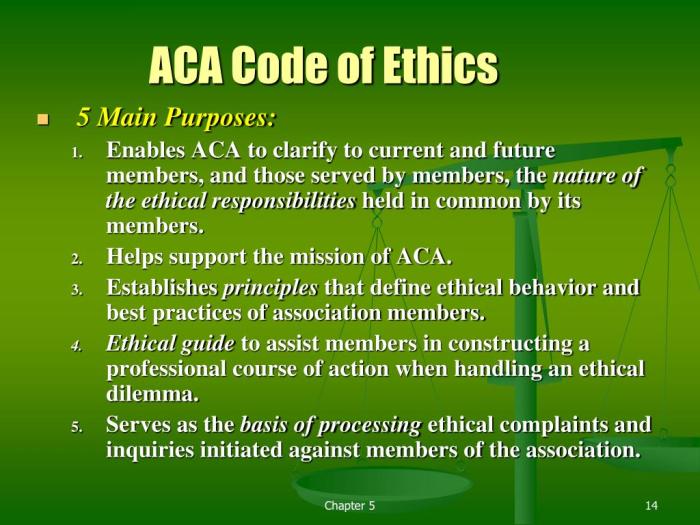
Ethical considerations in counseling vary depending on the setting, including schools, hospitals, and private practice. Counselors must be aware of the unique ethical challenges and responsibilities associated with each environment.
Organizational policies and legal regulations can significantly impact ethical practice. Counselors must familiarize themselves with these regulations and ensure their adherence to maintain ethical standards.
School Counseling
- Confidentiality and privacy concerns are paramount, particularly regarding minors.
- Counselors must balance the needs of students with the reporting requirements mandated by law.
- Ethical considerations extend to interactions with parents, teachers, and administrators.
Hospital Counseling
- Medical ethics intersect with counseling ethics, requiring counselors to navigate issues of patient confidentiality, informed consent, and end-of-life care.
- Counselors must collaborate effectively with medical professionals to provide holistic care.
- Ethical considerations include managing dual relationships and conflicts of interest.
Private Practice, Aca code of ethics 2024
- Counselors have greater autonomy but must adhere to ethical guidelines established by professional organizations.
- Informed consent, confidentiality, and boundary maintenance are crucial ethical considerations.
- Counselors must manage their own self-care and seek supervision to maintain ethical practice.
Training and Education in Ethics
Ethical training and education are indispensable for counselors, equipping them with the knowledge, skills, and values necessary for ethical decision-making and practice. It provides a foundation for understanding ethical principles, legal requirements, and best practices.
Continuing professional development and self-reflection are crucial for maintaining ethical competence. Counselors must engage in ongoing training to stay abreast of evolving ethical issues and best practices. Self-reflection helps counselors identify their own biases, values, and limitations, enabling them to make more informed and ethical decisions.
Role of Training and Education
- Imparts knowledge of ethical principles, laws, and regulations.
- Develops skills in ethical decision-making and problem-solving.
- Instills ethical values and professional conduct.
li>Provides a framework for ethical practice and accountability.
Importance of Continuing Professional Development
- Keeps counselors updated on ethical issues and best practices.
- Enhances ethical competence and reduces the risk of ethical violations.
- Demonstrates a commitment to ethical practice and professional growth.
Importance of Self-Reflection
- Promotes self-awareness and identification of biases.
- Facilitates ethical decision-making by considering personal values and limitations.
- Encourages ongoing ethical growth and improvement.
Ethical Implications for Research and Evaluation
Ethical considerations are paramount when conducting research and evaluating counseling interventions. Researchers must adhere to the highest ethical standards to ensure the well-being of participants and the integrity of the research process.
Informed Consent
Obtaining informed consent is crucial. Participants must be fully informed about the purpose, procedures, risks, and benefits of the research. They should have ample time to consider and ask questions before providing their consent. Researchers must ensure that consent is voluntary and not coerced.
Privacy and Confidentiality
Maintaining privacy and confidentiality is essential. Participants’ personal information and data must be protected from unauthorized access or disclosure. Researchers should use secure methods for data collection and storage. Participants should be assured that their privacy will be respected and that their information will not be used without their consent.
Protection from Harm
Researchers have an ethical obligation to protect participants from physical or psychological harm. This includes ensuring that research procedures are safe and that participants are not subjected to undue stress or discomfort. Researchers should have appropriate training and qualifications to conduct the research and should monitor participants for any adverse effects.
Data Analysis and Interpretation
Researchers must analyze and interpret data fairly and objectively. They should avoid bias or selective reporting of results. Data should be presented accurately and without distortion. Researchers should be transparent about their methods and findings and should acknowledge any limitations or uncertainties in their results.
Dissemination of Results
The dissemination of research findings should be responsible and ethical. Researchers should ensure that their findings are accurate and that they do not misrepresent or exaggerate the results. They should also consider the potential impact of their findings on participants and the broader community.
Ethical Review
Institutional Review Boards (IRBs) or similar ethical review bodies play a crucial role in ensuring the ethical conduct of research. Researchers should submit their research proposals to IRBs for review and approval. IRBs evaluate the ethical implications of the research and determine whether it meets ethical standards.
Continuing Education and Training
Researchers have an ongoing responsibility to stay up-to-date on ethical guidelines and best practices. They should participate in continuing education and training to enhance their knowledge and skills in ethical research conduct.
Legal and Regulatory Implications of the ACA Code of Ethics
The ACA Code of Ethics holds significant legal and regulatory implications for counselors. Adhering to the Code is crucial as ethical violations can have severe consequences, including legal repercussions and damage to the counseling profession’s reputation.
Compliance with the Code is essential for counselors to maintain their professional licenses and avoid legal liability. Ethical violations can result in complaints, investigations, disciplinary actions, and even criminal charges in certain cases.
Potential Consequences of Ethical Violations
- Loss of counseling license
- Fines and legal penalties
- Suspension or termination of employment
- Damage to reputation and credibility
- Difficulty obtaining professional liability insurance
Importance of Compliance
Compliance with the ACA Code of Ethics is vital for several reasons:
- Protects clients from harm and exploitation
- Maintains the integrity and reputation of the counseling profession
- Provides guidance for ethical decision-making
- Ensures accountability and transparency in counseling practices
Questions and Answers
What are the key principles of the ACA Code of Ethics 2024?
The ACA Code of Ethics 2024 emphasizes confidentiality, informed consent, maintaining professional boundaries, avoiding conflicts of interest, and promoting client well-being.
How does the code address ethical responsibilities in counseling practice?
The code Artikels counselors’ responsibilities to respect diversity, promote social justice, and advocate for clients. It also emphasizes the importance of cultural competence and self-reflection.
What are the steps involved in ethical decision-making according to the code?
The code provides a framework for ethical decision-making, involving identifying ethical issues, considering relevant ethical principles, consulting with colleagues or supervisors, and seeking ethical consultation when necessary.